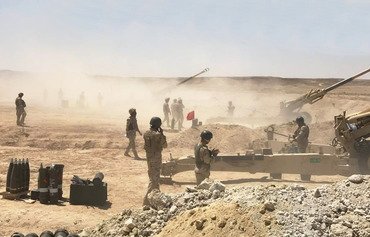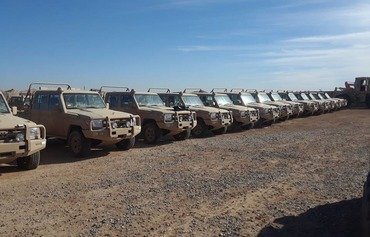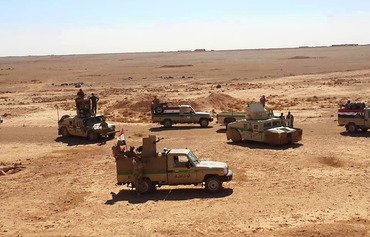Securing the border with Syria is one of the key challenges the Iraqi government is facing following the elimination of the remaining pockets of "Islamic State of Iraq and Syria" (ISIS) fighters in western Iraq, officials told Diyaruna.
To address this issue, the Iraqi government has designed a "comprehensive plan" to secure the Iraqi-Syrian border, Prime Minister Haider al-Abbadi announced at a December 5th press conference.
Iraq's Ministry of Defence now has "greater control over the border, and is upgrading the protection system with advanced means and methods of surveillance", said ministry media director Brig. Gen. Tahseen al-Khafaji.
"We have outposts and observation points along the border," he told Diyaruna. "The Border Guard forces are equipped with sophisticated equipment and devices capable of detecting any infiltration in record time."
Air surveillance also is being used to enhance the security of the border and border areas, he said, through the use of drones that are capable of monitoring suspicious activity and individuals in remote areas on a wide scale.
The international coalition has played a major role in supporting aerial reconnaissance operations, he said, by "targeting insurgent dens and repelling the attacks they launch from deep in the desert and across the border".
Building a stronger Iraqi army
The coalition has been training the Iraqi military, al-Khafaji said, equipping it with "weapons and technologies that make the performance of our forces more professional and sophisticated, especially those responsible for border security".
"This support is based on an international commitment to support Iraq and strengthen its defence systems to confront the terrorist elements, curtail their activities and eradicate them," he added.
The government plans to restructure and reorganise all units of the Iraqi army and train its forces on advanced military practices and systems, al-Khafaji said.
"The plan will be implemented in co-operation with the coalition forces, and aims in general to raise the competence of our forces in protecting the country and build up their capacities in the areas of border protection," he said.
On November 19th, Iraqi forces launched a campaign to eliminate the remaining pockets of ISIS fighters in the Upper Euphrates and in the desert areas near the border with Syria.
Today, military units are heavily deployed on the border strip between al-Waleed crossing in the Anbar province city of al-Qaim and al-Rabia crossing in western Ninawa province, a 600-kilometre stretch.
Re-establishing border security
Iraqi forces have erected high barriers and observation towers to secure the border strip and re-establish the boundaries delineating the border, which ISIS had removed following the declaration of its "caliphate".
The border area remains a source of concern, al-Khafaji said, as it is vast and its rugged terrain has made it a safe haven for militants.
The border strip with Syria is "the most complex area in Iraq", strategy expert Ahmed al-Sharifi told Diyaruna.
"The battle to wrest this area away from the terrorists has been resolved from the military standpoint, but that does not necessarily mean that security threats there have been eliminated," he said.
The adoption of any plan to secure the desert and the border area should be based on empowering local populations, al-Sharifi said.
Local residents and tribesmen contribute towards the establishment of security in their areas and protection of the border.
"Capabilities here are not measured by the number of troops guarding the area, but by [the equipment] they have at their disposal," he added.
This includes night-vision goggles, advanced communications systems, devices to monitor and detect movement from a distance and remote-controlled drones.
Iraqi army, SDF partnership
The Iraqi army and the Syrian Democratic Forces (SDF) recently agreed to co-operate to protect the Iraqi-Syrian border from ISIS infiltration attempts.
Commanders from the Iraqi army and the SDF met Sunday (December 10th) within the border zone between north-eastern Syria and Iraq to consult on co-ordinating border security, an SDF spokesman said.
The two parties agreed on joint co-ordination to protect the border strip and tackle any attempts by ISIS to infiltrate into the two countries, al-Baghdadi tribal mobilisation commander Sheikh Qatari al-Samarmad told Diyaruna.
Areas of Iraq adjacent to the border, extending from al-Qaim in Anbar to al-Rabia in Ninawa, are currently under the control of the al-Jazeera, Salaheddine and Ninawa operations commands, he said.
The army has begun to fortify the area with help from tribal volunteers, he said.
"The army has begun digging trenches, installing barbed wire, and repairing the old earth barrier that was built in the 1980s, parts of which were leveled by ISIS militants after 2014 to facilitate their vehicles’ passage," he said.
"We are at the disposal of the government and security leaders," said Sheikh Ghazi Nafe al-Jughaifi, a leader of the Jaghayfah tribe in Haditha.
"Our readiness level is high, and we all are ready to protect our western borders," he told Diyaruna.
Co-ordination a matter of necessity
The Iraqi-SDF agreement is a necessary measure, strategic expert Ahmed al-Sharifi told Diyaruna, calling for continued co-ordination and dialogue.
The situation at the border with Syria "requires us to keep up the dialogue with these forces", he said. "Any co-ordination agreement with them to secure the border would be a matter of necessity."
ISIS fighters "still pose a threat in border areas between Iraq and Syria", Anbar provincial council member Farhan Mohammed al-Dulaimi told Diyaruna.
"The task of securing the border is very important," he said. "Pressure should be maintained on the terrorists there, and they should not be allowed to move about freely."
Fighting continues on the Syrian side against pockets of ISIS fighters in the city of Albu Kamal and other border areas in Deir Ezzor province, he said.
Enhanced co-ordination between the Iraqi army and the SDF is a "necessary step to control and secure the border", al-Dulaimi said.

![An Iraqi Border Guard unit patrols the border strip with Syria. [Photo courtesy of Commando Brigade of the Border Guard Force]](/cnmi_di/images/2017/12/15/10727-Iraq-Syria-border-600_384.jpg)







The main reason for insecurity is the negligence by states of their borders and the existence of basic holes due to intelligence co-operation.
Reply1 Comment(s)